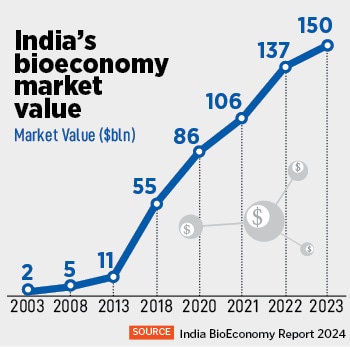Context:
India's bio-economy has recently seen tremendous growth over the past decade, increasing 16 times from $10 billion in 2014 to $165.7 billion in 2024. Union Minister Dr. Jitendra Singh shared these figures at the BIRAC Foundation Day event while releasing the "India Bioeconomy Report 2025" (IBER 2025). This growth highlights India's rising position as a global biotechnology leader, with the sector now contributing 4.25% to the country's GDP.
Launch of BioSaarthi:
During the event also an innovative global mentorship initiative called BioSaarthi was launched, which is an innovative global mentorship initiative designed to support biotech startups.
This initiative seeks to connect emerging entrepreneurs with experienced mentors from around the world, providing valuable guidance and resources to help these startups scale.

About bioeconomy:
The bioeconomy refers to economic activities that involve the use of biotechnology and biomass to produce goods, services, and energy. It is closely linked to scientific research and technological advancements, particularly in the fields of genetics and biotechnology.
This includes industries such as agriculture, health, chemicals, and energy, where biological resources like crops, forests, fish, animals, and microorganisms are harnessed for production.
Drivers of bioeconomy:
India’s commitment to biotechnology as a central pillar of its economic strategy has been crucial in driving this transformation. The sector has achieved an impressive compound annual growth rate (CAGR) of 17.9% over the past four years, positioning India as a rising leader in the global biotech space. The government's proactive policies, infrastructure investment, and emphasis on research and development have paved the way for this rapid expansion.
The Bio-E3 Policy
Biotechnology for Economy, Employment, and Environment—aims to accelerate research, innovation, and entrepreneurship in the biotech sector.
Under this policy, initiatives such as Bio-AI Hubs, Bio foundries, and bio-enabler hubs will be established to integrate advanced technologies with biomanufacturing.
Assam has become the first state to adopt the BioE3 framework, setting a precedent for other states.
What is biotechnology?
Biotechnology, or biotech, is the use of biology and technology to develop new products, methods, and organisms. It aims to improve human health and society. Biotechnology is sub part of bio economy.
Biotechnology in India has led to groundbreaking innovations such as the development of Nafithromycin, India’s first indigenous antibiotic for respiratory diseases, and successful gene therapy trials for hemophilia.
Additionally, collaborations between the Department of Biotechnology and ISRO are laying the foundation for space biology and space medicine, ensuring astronaut health and advancing medical solutions for future space missions.
About BIRAC:
BIRAC, the Biotechnology Industry Research Assistance Council, is a Section 25 ‘Not-for-Profit Company’ of the Government of India, registered under the Indian Companies Act of 1956.
Set up by the Department of Biotechnology (DBT), BIRAC serves as an interface agency, providing support to the emerging biotech industry in India.
It acts as a single-window facility to promote strategic research, innovation, and affordable product development in biotechnology.
Conclusion:
As India continues to make strides in the biotechnology sector, it is poised to become a powerhouse in the global biotech arena, leading the way in innovation, research, and economic growth.






